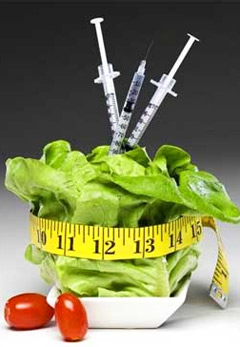|
|
Scary Diets Models take to get Dangerously Thin
Women Fitness has made an attempt to unreveal unhealthy practices prevalent
among models to remain thin. Sometimes for this models are themselves to blame
or it is the peer pressure and sometimes their agents build up the pressure.
Models smoke cigarettes, take daily colonics, laxatives, diet pills, Adderall,
prescription drugs that suppress the appetite are few of the weight-loss
techniques they use. Few models resort to HCG Diet, T3 thyroid hormone
injections, Hypnotherapy, Cotton balls diet, Water Pills, Fat Flush Diet, Soup
Diet and Colonic Hydrotherapy. Women Fitness also makes you aware about Council
of Fashion designers of America (CFDA) Health Initiative for Models with regard
to their eating disorder behaviour.
 HCG
Diet HCG
Diet
 British
endocrinologist Albert T. W. Simeons' proposed HCG as an adjunct to an
ultra-low-calorie weight-loss diet (less than 500 calories). Simeons, while
studying pregnant women in India on a calorie-deficient diet, and "fat boys"
with pituitary problems (Fr�lich's syndrome) treated with low-dose HCG, claimed
that both lost fat rather than lean (muscle) tissue. He reasoned that HCG must
be programming the hypothalamus to do this in the former cases in order to
protect the developing fetus by promoting mobilization and consumption of
abnormal, excessive adipose deposits. British
endocrinologist Albert T. W. Simeons' proposed HCG as an adjunct to an
ultra-low-calorie weight-loss diet (less than 500 calories). Simeons, while
studying pregnant women in India on a calorie-deficient diet, and "fat boys"
with pituitary problems (Fr�lich's syndrome) treated with low-dose HCG, claimed
that both lost fat rather than lean (muscle) tissue. He reasoned that HCG must
be programming the hypothalamus to do this in the former cases in order to
protect the developing fetus by promoting mobilization and consumption of
abnormal, excessive adipose deposits.
Simeons in 1954 published a book entitled Pounds and Inches, designed to combat
obesity. Simeons, practicing at Salvator Mundi International Hospital in Rome,
Italy, recommended low-dose daily HCG injections (125 IU) in combination with a
customized ultra-low-calorie (500 cal/day, high-protein, low-carbohydrate/fat)
diet, which was supposed to result in a loss of adipose tissue without loss of
lean tissue. Simeons' results were not reproduced by other researchers and in
1976 in response to complaints the FDA required Simeons and others to include
the following disclaimer on all advertisements:
These weight reduction treatments include the injection of HCG, a drug which has
not been approved by the Food and Drug Administration as safe and effective in
the treatment of obesity or weight control. There is no substantial evidence
that HCG increases weight loss beyond that resulting from caloric restriction,
that it causes a more attractive or "normal" distribution of fat, or that it
decreases the hunger and discomfort associated with calorie-restrictive diets. �
1976 FDA-mandated disclaimer for HCG diet advertisements
There was a resurgence of interest in the "HCG diet" following promotion by
Kevin Trudeau who was later banned from making HCG diet weight-loss claims by
the U.S. Federal Trade Commission. Review studies refuting the HCG diet have
been published in the Journal of the American Medical Association and the
American Journal of Clinical Nutrition,both concluding that HCG is neither safe
nor effective as a weight-loss aid.
A meta analysis found that studies supporting HCG for weight loss were of poor
methodological quality and concluded that "there is no scientific evidence that
HCG is effective in the treatment of obesity; it does not bring about
weight-loss or fat-redistribution, nor does it reduce hunger or induce a feeling
of well-being".
There is no scientific evidence that HCG is effective in the treatment of
obesity. The meta-analysis found insufficient evidence supporting the claims
that HCG is effective in altering fat-distribution, hunger reduction or in
inducing a feeling of well-being. The authors stated ��the use of HCG should be
regarded as an inappropriate therapy for weight reduction�� In the authors
opinion, �Pharmacists and physicians should be alert on the use of HCG for
Simeons therapy. The results of this meta-analysis support a firm standpoint
against this improper indication. Restraints on physicians practicing this
therapy can be based on our findings.� � American Society of Bariatric
Physicians' commentary on Lijesen et. al (1995)
According to the American Society of Bariatric Physicians, no new clinical
trials have been published since the definitive 1995 meta-analysis. The
scientific consensus is that any weight loss reported by individuals on an "HCG
diet" may be attributed entirely to the fact that such diets prescribe calorie
intake of between 500 and 1,000 calories per day, substantially below
recommended levels for an adult, to the point that this may risk health effects
associated with malnutrition.
The United States Food and Drug Administration has stated that over-the-counter
products containing HCG are fraudulent and ineffective for weight loss. They are
also not protected as homeopathic drugs and have been deemed illegal substances.
HCG itself is classified as a prescription drug in the United States and it has
not been approved for over-the-counter sales by the FDA as a weight loss product
or for any other purposes, and therefore neither HCG in its pure form nor any
preparations containing HCG may be sold legally in the country except by
prescription.
In December 2011, FDA and FTC started to take actions to pull unapproved HCG
products from the market. In the aftermath, some suppliers started to switch to
"hormone-free" versions of their weight loss products, where the hormone is
replaced with an unproven mixture of free amino acids or where radionics is used
to transfer the "energy" to the final product.
Next..
Dated 07 March 2014
|
|
|
|
|









